The OCZ Vertex 3 Review (120GB)
by Anand Lal Shimpi on April 6, 2011 6:32 PM ESTAnandTech Storage Bench 2011 - Light Workload
Our new light workload actually has more write operations than read operations. The split is as follows: 372,630 reads and 459,709 writes. The relatively close read/write ratio does better mimic a typical light workload (although even lighter workloads would be far more read centric).
The I/O breakdown is similar to the heavy workload at small IOs, however you'll notice that there are far fewer large IO transfers:
| AnandTech Storage Bench 2011 - Light Workload IO Breakdown | ||||
| IO Size | % of Total | |||
| 4KB | 27% | |||
| 16KB | 8% | |||
| 32KB | 6% | |||
| 64KB | 5% | |||
Despite the reduction in large IOs, over 60% of all operations are perfectly sequential. Average queue depth is a lighter 2.2029 IOs.
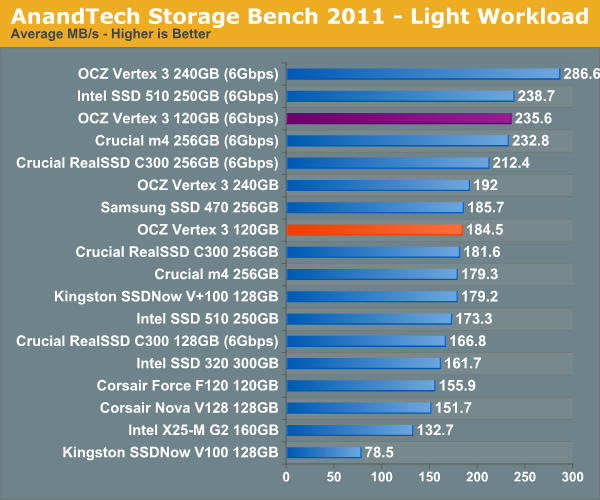
While our heavy 2011 workload may be a little heavy on the writes, the light workload is a bit more balanced. As a result we see the 120GB Vertex 3 move up in the charts a bit more. It's still not as quick as the 240GB drive but it's pretty much quicker than anything else.
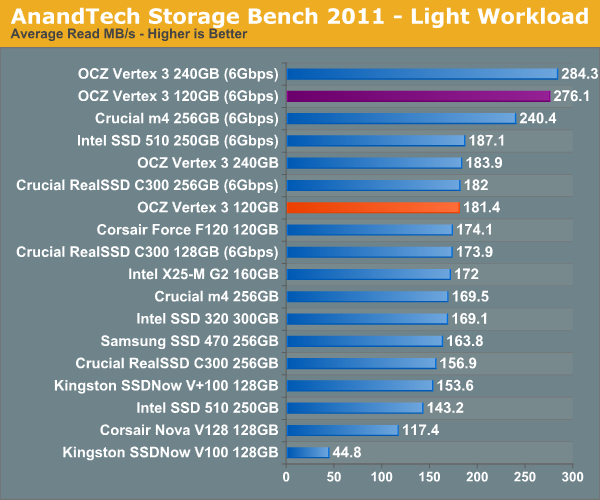
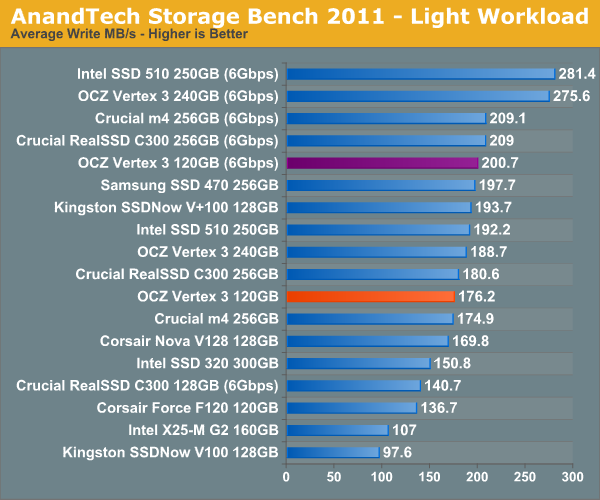
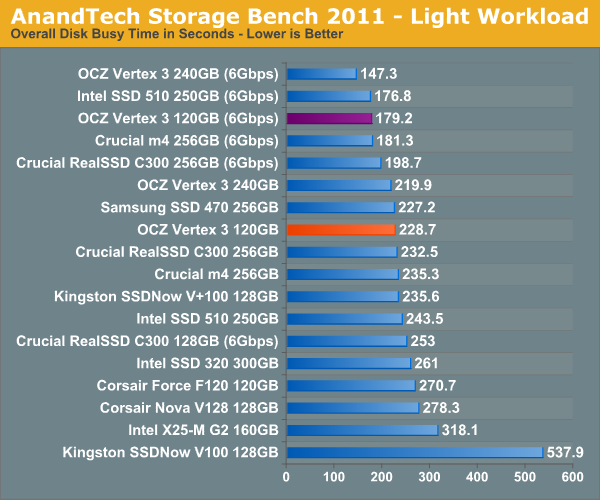
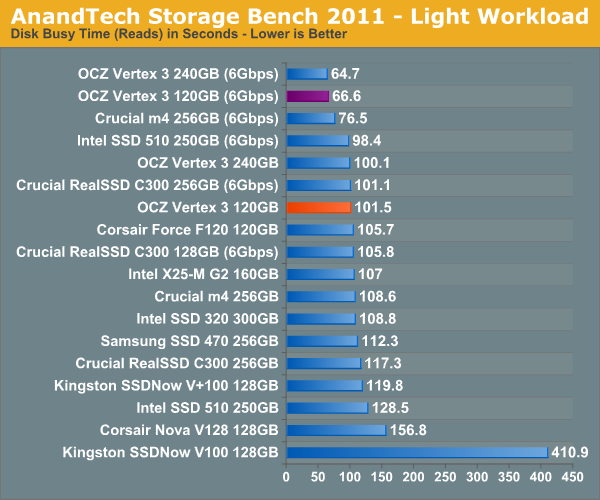
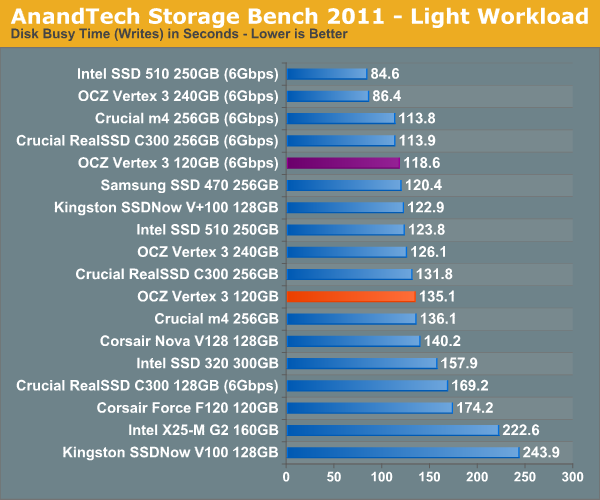










153 Comments
View All Comments
casteve - Thursday, April 7, 2011 - link
Great review! Thanks for carrying the 120GB torch :)I'd love to see a couple of HDDs added to the 2011 bench (like they are in the 2010 bench) to keep the perspective in play.* Most people are still moving from an HDD to an SSD and not just upgrading their SSD's.
* stuff a 120GB SSD in yer laptop for $200 to replace a 5400rpm HDD and improve gaming IOPS by 5x is more impressive than replacing an existing 120GB SSD with a newer one for $250 and improve gaming IOPS by 10%. Extreme example...but you get the idea.
Gasaraki88 - Thursday, April 7, 2011 - link
I want to thank you for writing this article and keeping the companies honest. Without smart people like you, companies will overstate performance and to the common person it will look fine because we don't have the proper tools to test.I'll been reading Anandtech for 11 years now. The quality is still top notch unlike some other sites I used to go to.
cknobman - Thursday, April 7, 2011 - link
Dont buy OCZ products.Anand and countless consumer reviews from Newegg have proved that OCZ does not put out a consistent and reliable level of product.
Im not one for rolling the crap dice with my hundreds of hard earned dollars.
hackztor - Thursday, April 7, 2011 - link
LOL, okay go spend your hard earned money on last year performance intel new drives.seapeople - Thursday, April 7, 2011 - link
Wow you got him there! Yeah, why doesn't he just buy an Intel drive. That would be funny because then he would have to wait 5.6 seconds to open Photoshop instead of 5.2 seconds. Or it would take a full 33 seconds to reboot instead of 35 seconds. I bet he's so unintelligent that he would actually accept crappy last-generation solid state drive performance like that at a lower price.semo - Friday, April 8, 2011 - link
Corsair, patriot and many other SSD makers use SF controllers. You just have to be sure you know what firmware you're getting. You have to be much more careful with OCZ as you can't trust them to sell you what they claim on the box.Stargrazer - Thursday, April 7, 2011 - link
It's awesome that you're reviewing the 120GB version first. It's the version that I believe most people would be most interested in getting, so it's great that we'll be able to see how it performs, rather than only seeing the higher numbers of a ~256GB version that's so expensive that most people would never get it. It's fantastic even. Did I mention that it's awesome?Unfortunately, since the ~128GB versions haven't always been reviewed in the past, this also means that we don't really have much to compare the numbers to. How do we know if the 120GB Vertex 3 is competitive if we don't know the performance of its competitors?
I can understand if it might take a while to get the numbers for comparable versions of the 510, 310 and m4 (though I really hope that in the future you continue to press on for getting ~128GB versions in time for the initial reviews), but would it at least be possible to get the complete numbers for the 128GB version of the RealSSD C300? For some reason it doesn't seem to be in the IOmeter tests.
Oh. Isn't it time that you stopped using "I didn't expect to have to debut this so soon" in the introduction to the 2011 Storage Bench? :)
KenPC - Thursday, April 7, 2011 - link
A humorous thought of little relevance. but.. if OCZ rebrands the Vertex 2 as the 2b to solidify performance specs. then as I shop I will be thinking....Is this OCZ drive a 2b or not 2b, that is the question.....
Omid.M - Thursday, April 7, 2011 - link
They saw Anand's Vibrams and knew he meant business (casual).:)
sethm1 - Thursday, April 7, 2011 - link
I was looking forward to the Vertex 3 as being the next best thing.And so was hoping for a more positive review (but yes appreciate the candor in the review).
My question is, after all is said and done, is the Vertex 3 still better than the Vertex 2 (120GB versions)?
Should I go out and get a version 2?